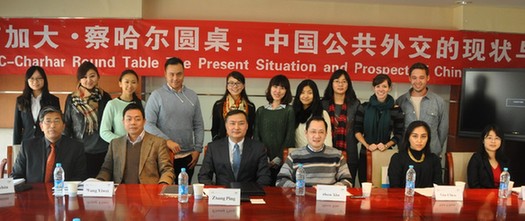Roundtable analyzes China's public diplomacy efforts
- By Zhang Fang
 0 Comment(s)
0 Comment(s) Print
Print E-mail China.org.cn, January 11, 2013
E-mail China.org.cn, January 11, 2013
Although China's public diplomacy efforts have run into obstacles over the years, great progress has still been made, international students and Chinese experts said at a recent roundtable in Beijing.
|
|
|
Students from the University of Southern California (USC) participated in a roundtable discussion with Chinese experts concerning the future of China's public diplomacy on January 10, 2013 in Beijing. [China.org.cn] |
"The concept of public diplomacy only appeared in China since 2001, but it has built certain mechanisms and theories ever since then to promote communications and exchanges with outside world," said Zhang Ping, vice president of Chinese People's Institute of Foreign Affairs, at the forum.
The Confucius Institute and Chinese media have done a lot to establish a new image for China and increase communications in many different ways with people from other countries, said Wang Yingwei, professor of Renmin University of China.
China's public diplomacy focuses on four different targets, including western world like the U.S. and the European Union, neighboring countries, and developing and emerging countries, he said, through talks and exchanges among governments, societies and peoples.
However, the achievements of public diplomacy meet difficulties when they are overshadowed by political events, such as territorial disputes, said Shen Xin, secretary general of the China Friendship Foundation for Peace and Development.
Shen said China and Japan are two countries with a long history who have tried very hard to reduce tensions by founding national associations in each others' countries.
"But since the Diaoyu Island incident happened, the [fruits] of these efforts suddenly disappeared," he said.
Nine University of Southern California (USC) students majoring in public diplomacy also participated in this meeting. Hu Shaocong, one of the students, asked about how China's public diplomacy dealt with disputes like Diaoyu Islands. In response, Shen said that public diplomacy efforts mainly work through people to people exchange, as opposed to through direct exchanges by government agencies.
"Generally, the final say [in disputes] occurs at the government level," Zhang added.
Public diplomacy, Shen said, tends to be nongovernmental behavior supported directly by the country, such as the Confucius Institute, which tries to teach Chinese culture worldwide, as well as international events like the 2008 Beijing Olympic Games and 2010 Shanghai Expo.
But public opinion will affect the policy makers, and therein lies the power of public diplomacy, he said.
Students were also interested in how China intends to change her image. Frank Cheng said it seems China has made great efforts to reach out to foreign countries, such as in its publicity video which was featured in Times Square, but only received minimal feedback from the U.S. public.
Liu Chen, professor of Beijing Foreign Studies University, said that students should examine China's public diplomacy from a longer-term context.
"[The Times Square video] did send some positive messages," she said. "An American woman said in an interview it's good to see the different colors of China from the video." However, Liu agreed that the quality of China's public diplomacy efforts must also be improved.
It will take time to make further progress in public diplomacy, and will require more participation by those who care about China, Zhang said. "We need people like you, foreign students who are interested in China...to be a bridge between China and the world," he said.
The roundtable, themed "The Present Situation and Prospect of China's Public Diplomacy," has been hosted by the Charhar Institute, a nongovernmental think bank based in Hebei Province on Thursday in Beijing.







Go to Forum >>0 Comment(s)